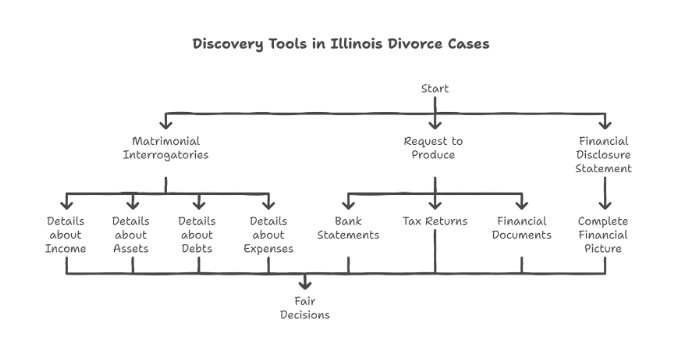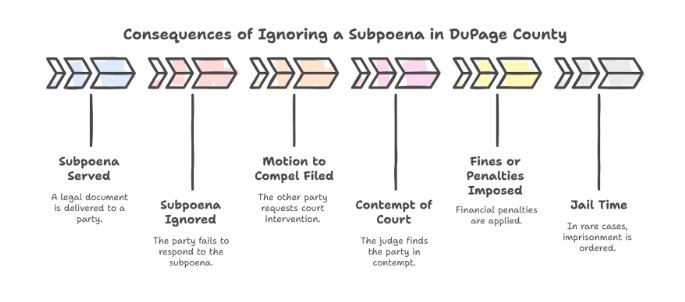

Originally published: July 2025
Divorce gets confusing and stressful, especially when you’re trying to figure out court procedures in DuPage County.
One of the main steps is called discovery—this is when both spouses exchange information about their finances, property, and other significant issues.
Discovery ensures that both sides have the necessary facts to reach fair agreements on matters such as property division, spousal support, and child-related issues.
During divorce, experienced divorce attorneys can walk you through the discovery phase and help you figure out what documents or answers you’ll need to provide.
The process might involve sharing bank statements, answering written questions, or even giving statements under oath.
Learning how discovery works matters if you’re facing divorce in DuPage County. Knowing your rights and what to expect can give you more confidence during a tough time.
Discovery plays a central role in divorce cases in DuPage County. It’s the formal step where both sides share key information before any trial or big decision.
In Illinois, discovery lets each spouse learn about the other’s finances, property, and debts. You’ll likely exchange documents such as bank statements, tax returns, and pay stubs.
The goal is to maintain fairness and transparency for everyone involved.
Here are some common methods of discovery:
People often use discovery during litigation, but it can also be beneficial in mediation. If someone refuses to cooperate, the court can intervene and ensure that everyone fulfills their obligations.
The discovery process enables both sides to make informed decisions about dividing assets, establishing support, or resolving disputes.
A clear discovery phase reduces surprises and helps people feel more confident about their choices.
Discovery is a big step in the divorce process in DuPage County. It helps each spouse see what the other has—finances, debts, property, and so on.
Fairness in dividing assets is just not possible without open and honest information. Discovery enables both parties to exchange records, including bank statements, tax returns, and property details.
It can also reveal hidden assets or income that may alter the division of assets. This matters for decisions about property, child support, and spousal support.
Some common discovery tools include:
Discovery isn’t just about money. It can cover information about children, such as their needs or who is responsible for what. That helps the court make the best decisions for the family.
It matters in DuPage County because there are local rules and deadlines to follow. Miss something or respond late, and you could face serious legal trouble.
Going through a divorce in DuPage County? Let Cooper Trachtenberg Law Group guide you through the discovery process with clarity and confidence—schedule your consultation today.
If you’re ready to get started, call us now!

In Illinois divorce cases, discovery utilizes several primary tools to facilitate the exchange of information fairly between both parties.
These tools help each spouse gather facts about assets, debts, income, and other financial details that affect matters such as property division and child support.
Matrimonial Interrogatories are a go-to tool. One spouse sends written questions to the other, looking for details about assets, liabilities, income, and expenses. The answers must be written and taken under oath.
A Request to Produce allows a spouse to request documents, such as bank statements, tax returns, pay stubs, or records related to property and debts. These papers reveal the current financial situation.
Another key tool is the Financial Disclosure Statement. Both sides typically have to complete this form, listing all income, debts, assets, and monthly expenses. It needs to be complete and honest to maintain fairness.
Here’s a quick look at what these main tools can reveal:
| Tool | What it Reveals |
| Matrimonial Interrogatories | Details about income, assets, debts, and expenses |
| Request to Produce | Bank statements, tax returns, and other financial docs |
| Financial Disclosure Statement | Complete picture of finances and obligations |
All these methods help both spouses and the court get the info they need for decisions about support, dividing assets, and more.
A subpoena is a legal tool people use in divorce cases to require someone to provide information. Sometimes it means showing up in court, sometimes it means bringing specific documents along.
Subpoenas come in handy when one side needs info and the other side isn’t handing it over easily. In DuPage County, either party or their attorney can request a subpoena during the discovery process.
Discovery requests may request items such as bank records or emails, or may even require an individual to answer questions in a deposition. If someone drags their feet, a subpoena makes it a legal requirement.
Here are a few common types of subpoenas in divorce cases:
| Type | What It Does |
| Subpoena for Documents | Orders someone to bring papers or records to court |
| Deposition Subpoena | Requires a person to answer questions under oath |
| Trial/Hearing Subpoena | Requires a witness to appear in court or at a hearing |
Sometimes, you might need a subpoena for third parties—like banks or employers—to get the evidence you need. This is especially useful if a spouse is hiding money or assets.
If you ignore a subpoena, you may face legal consequences, such as being held in contempt of court.
Both spouses should understand and respect the role of subpoenas in divorce discovery, as they play a significant part in the process.
Depositions are one method of using subpoenas. In a deposition, the person must answer questions about the case, and all the answers are recorded for later use. This helps bring the facts out and supports fair decisions.
Struggling to get the documents or answers you need? Cooper Trachtenberg Law Group can help enforce your rights with the strategic use of subpoenas and discovery tools—contact us now.
If you’re ready to get started, call us now!

Ignoring a subpoena in DuPage County divorce cases is a risky move. Courts expect everyone to respond when served with a subpoena.
If someone ignores a subpoena, the court can step in.
Here are some possible steps they might take:
Dragging your feet on a subpoena can slow down the divorce process and increase costs for both parties.
Judges take this matter seriously—subpoenas ensure that all the evidence is made available in the open.
People can challenge a subpoena if they believe it’s incorrect, but ignoring it without a valid reason can result in more severe penalties, such as fines or imprisonment.
Courts in DuPage County view ignoring a subpoena as a direct challenge to the legal process.
Families dealing with divorce really should take subpoenas and court orders seriously. Responding honestly and on time helps make the process smoother—and fairer—for everyone.
Local court rules and the Illinois Supreme Court Rules govern discovery in DuPage County divorce cases.
These guidelines aim to ensure that both parties provide truthful and complete information, although the process can sometimes feel overwhelming.
The 18th Judicial Circuit in DuPage County lays out specific expectations for discovery documents.
Local court rules state that you shouldn’t file documents such as depositions, interrogatories, or requests for documents with the clerk unless the court orders it or a dispute needs to be resolved.
This approach keeps court records focused on what matters.
Common forms of discovery include:
The court expects everyone involved to respond honestly and meet the deadlines. If someone ignores these rules, legal action will follow pretty quickly.
A DuPage County divorce attorney guides clients through their responsibilities and advocates for their rights during the discovery process.
Attorneys ensure that clients comply with both local requirements and Illinois Supreme Court standards, which provide significant relief for most individuals.
Getting a handle on these guidelines early can be less stressful. If you prepare your documents ahead of time and stay in touch with legal counsel, you’ll have a much better shot at meeting the court’s expectations.
Discovery plays a significant role in divorce cases in DuPage County. It enables both spouses to access key information, including financial records and property details.
This process gives everyone a fair chance to present their side. Honestly, it’s kind of essential if you want things to feel balanced.
People in DuPage County use a handful of discovery methods during divorce. Here’s what usually comes up:
Both sides have to share information, unless it’s privileged or confidential. Full and honest disclosure is crucial for fair settlements, particularly in cases involving property or support issues.
If someone refuses to cooperate, they can face legal consequences. That’s one way the system attempts to maintain fairness.
Discovery might feel overwhelming at first. But with the right support, it gets easier to handle.
Working with a knowledgeable attorney is extremely helpful when it comes to gathering documents and determining what is required.
Don’t face divorce discovery alone. Cooper Trachtenberg Law Group supports DuPage County families with experienced legal guidance every step of the way—call now to discuss your case.
What is discovery in a DuPage County divorce case?
Discovery is the formal exchange of information between spouses during the divorce process. It includes financial records, property details, and other relevant information, ensuring that both parties make informed decisions.
What documents are commonly requested during divorce discovery?
Common documents include tax returns, pay stubs, bank statements, mortgage documents, retirement account info, and credit card statements. These help paint a full picture of each party’s financial status.
Can discovery uncover hidden assets?
Yes. Discovery tools, such as subpoenas and interrogatories, can reveal undisclosed income, accounts, or property. This protects your rights during asset division and spousal support decisions.
What happens if my spouse doesn’t respond to discovery?
If a spouse ignores discovery requests, your attorney can file a motion to compel. The court may also issue fines, sanctions, or hold them in contempt for failing to comply.
How long does the discovery process take in DuPage County?
Discovery timelines vary, typically spanning several weeks to a few months, depending on the case’s complexity, the volume of documents, and court deadlines in DuPage County.
Do I need a lawyer to handle discovery in my divorce?
While not legally required, working with a family law attorney ensures proper compliance, prevents delays, and helps you avoid costly mistakes when responding to or issuing discovery requests.